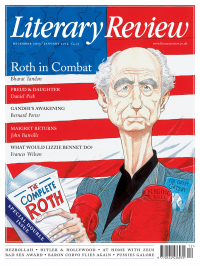Frank Brinkley
Point Made
Shady Characters: Ampersands, Interrobangs and Other Typographical Curiosities
By Keith Houston
Particular Books 340pp £16.99
What began as a series of distinctiones – dots, really – in the third century BC, instituted by the scholar Aristophanes of Byzantium at the Library of Alexandria as a means for making the WALLSOFUNSPACEDTEXT in papyri more intelligible, has evolved into what we now consider punctuation. The developments undergone by his trio . · ·, which initially were placed after corresponding rhetorical units called the komma, kolon and periodos, are good examples of what has happened to most punctuation marks throughout history, as competing writers and critics have adapted the forms and usages of characters in the pursuit of standardisation, clarification or experimentation. In Shady Characters, Keith Houston relates such transformations and evolutions for his chosen symbols – manicule *, pilcrow ¶, interrobang ‽, octothorpe #, ampersand &, at-sign @, asterisk * and dagger †, a brace of hyphens and speech marks.
After the first forays in Alexandria (the use of the asterisk and dagger, more properly known as the obelos, for textual criticism in early Homeric manuscripts dates from this period), the advent of Christianity brought a new wave of marginal scribblers. The early Bibles that survive illustrate the tug-of-war over

Sign Up to our newsletter
Receive free articles, highlights from the archive, news, details of prizes, and much more.@Lit_Review
Follow Literary Review on Twitter
Twitter Feed
Though Jean-Michel Basquiat was a sensation in his lifetime, it was thirty years after his death that one of his pieces fetched a record price of $110.5 million.
Stephen Smith explores the artist's starry afterlife.
Stephen Smith - Paint Fast, Die Young
Stephen Smith: Paint Fast, Die Young - Jean-Michel Basquiat: The Making of an Icon by Doug Woodham
literaryreview.co.uk
15th-century news transmission was a slow business, reliant on horses and ships. As the centuries passed, though, mass newspapers and faster transport sped things up.
John Adamson examines how this evolution changed Europe.
John Adamson - Hold the Front Page
John Adamson: Hold the Front Page - The Great Exchange: Making the News in Early Modern Europe by Joad Raymond Wren
literaryreview.co.uk
"Every page of "Killing the Dead" bursts with fresh insights and deliciously gory details. And, like all the best vampires, it’ll come back to haunt you long after you think you’re done."
✍️My review of John Blair's new book for @Lit_Review
Alexander Lee - Dead Men Walking
Alexander Lee: Dead Men Walking - Killing the Dead: Vampire Epidemics from Mesopotamia to the New World by John Blair
literaryreview.co.uk